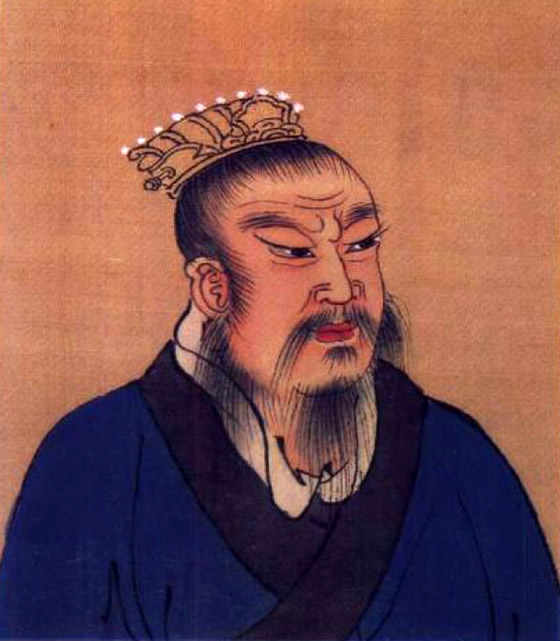Liu Bang Facts For Kids
Liu Bang, also known as Emperor Gaozu of Han, was the founder of the Han Dynasty and is celebrated for his transition from a commoner to an emperor, establishing a legacy of reform and governance.


Set reading age
View for Kids
Easy to read and understand
View for Students
Clear, detailed explanations
View for Scholars
Deep dives and big ideas
Introduction
Liu Bang was the founder of the Han Dynasty, an important empire in ancient China! 🌟He lived from about 256 BC to 195 BC. Liu Bang started as a common person, a farmer, before becoming a famous emperor. The Han Dynasty lasted for over 400 years and is known for many achievements, such as advancements in science, art, and trade. 📚Liu Bang is often celebrated for his leadership and bravery. His story shows that anyone can achieve great things with hard work and determination!
Gallery of Liu Bang Facts For Kids
Biography
Liu Bang was born in the village of Pei in modern-day Jiangsu, China. 🏠As a teenager, he worked as a police officer and later became a farmer. He fought in a big war against the harsh Qin Dynasty. Liu Bang became a leader of his own group of warriors! ⚔️ After winning many battles, he changed his name to Emperor Gaozu of Han, making him the first ruler of the Han Dynasty. He was a clever and kind emperor who listened to his people, which made him very popular!
Rise To Power
Liu Bang’s rise to power began when he led a rebellion against the Qin Dynasty in 209 BC. ⚔️ After the fall of the Qin, he fought against other leaders to become the most powerful. His smart strategies and loyal friends helped him win! In 202 BC, he was declared emperor. His major victory at the Battle of Gaixia in 202 BC against a strong rival named Xiang Yu helped secure his throne! 👑This victory marked the start of the Han Dynasty, bringing peace and stability to China.
Policies And Reforms
As emperor, Liu Bang made important changes. He lowered taxes to help farmers, which made him popular! 🌾Liu Bang also reduced strict laws from the Qin Dynasty. He believed in fairness and kindness. He organized the military to ensure safety, and he created a network of roads and canals to help trade. 🚜These policies improved the lives of many people in China and fostered growth and culture during the Han period. Liu Bang's thoughtful reforms set the stage for a prosperous dynasty!
Cultural Contributions
The Han Dynasty was a time of many discoveries and cultural developments! 🎨Liu Bang supported scholars and artists. The invention of paper and advancements in silk production happened during this time. 🐼Additionally, literature flourished, with famous texts like the “Records of the Grand Historian” by Sima Qian. The Han people also developed Confucianism as an important philosophy, focusing on family and respect for tradition. These cultural contributions have influenced China for thousands of years!
Conflicts And Challenges
Liu Bang faced many challenges as a leader. One major conflict was with Xiang Yu, who wanted the throne for himself. ⚔️ They fought several battles to claim power. Liu Bang also had to manage rebellions and keep the empire united. Another challenge was the fight against nomadic tribes like the Xiongnu, who threatened trade routes. 🐎Liu Bang managed these conflicts through alliances and military strength. Despite these struggles, he worked hard to maintain peace and stability in his empire.
Liu Bang In Popular Culture
Liu Bang is a famous character in stories and dramas! 🎭He appears in many movies, television shows, and Chinese operas. His life and rise to power inspire many people. 🏆Stories about him often highlight his bravery and intelligence as a leader. 'The King of Han' is a popular drama that shows his exciting adventures! Liu Bang is celebrated as a hero in China's history, making him an important figure in cultural expressions even today!
Legacy And Historical Impact
Liu Bang's legacy is significant! 💫He laid the foundation for the Han Dynasty, one of China’s greatest empires. His leadership style, which focused on kindness and listening to people, left a lasting impact on future Chinese rulers. The Han Dynasty helped shape Chinese identity and culture, influencing politics, economy, and education far beyond his reign! His story still teaches us the values of hard work and determination today! 🌟
Establishment Of The Han Dynasty
In 202 BC, Liu Bang officially established the Han Dynasty! 🏰He chose the capital city as Chang'an, present-day Xi'an. Liu Bang wanted to create a government that was different from the harsh Qin. He used smart leaders and encouraged trade on the Silk Road, which helped the economy grow! 🌍The Han Dynasty is known for creating the civil service system, meaning the government jobs were filled by exam-qualified people, not just family names. This allowed many talented people to contribute to society!
Comparative Analysis With Other Leaders
Compared to other leaders, Liu Bang had a unique story! ✨Unlike Alexander the Great or Julius Caesar, who had noble beginnings, Liu Bang started as a farmer. 🌾He focused on the welfare of his people rather than just military power. While some rulers were very strict, Liu Bang introduced kindness and lower taxes. His ability to learn from others and adapt made him a remarkable leader in Chinese history! Liu Bang’s legacy continues to resonate across cultures, showing that great leaders can come from humble beginnings!
Liu Bang Facts For Kids Quiz


Make things. Learn new skills. Share safely.
DIY is a creative community where kids draw, build, explore ideas, and share.
No credit card required